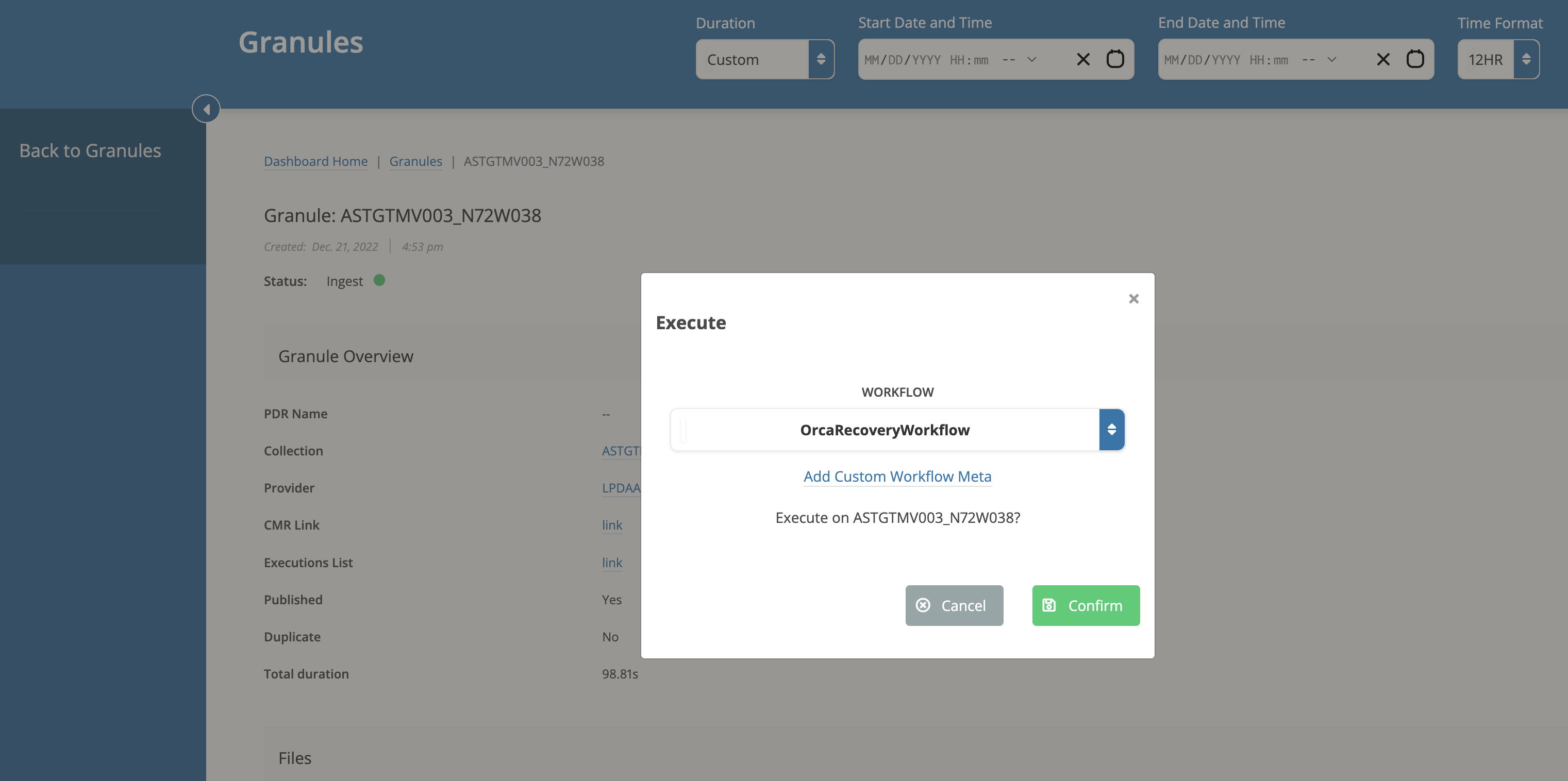Data Recovery
As of ORCA v8.1 the Cumulus Message Adapter is no longer used. Users will need to deploy the recovery adapter before the recovery can be ran. Reference Deployment with Cumulus
Recovery via Cumulus Dashboard
Recovery processes are kicked off manually by an operator through the Cumulus Dashboard. The dashboard calls an API which kicks off a recovery workflow. Recovery is an asynchronous operation since data requested from GLACIER can take 4 hours or more to reconstitute, and DEEP_ARCHIVE can take 12 hours. Since it is asynchronous, the recovery container relies on a database to maintain the status of the request and event driven triggers to restore the data once it has been reconstituted from archive into an S3 bucket. Currently, data is copied back to the Cumulus S3 primary data bucket which is the default bucket. The operator has the option to override the default bucket with another restore bucket if desired. Determining the status of the recovery job is done manually by querying the database directly or by checking the status on the dashboard.
A screenshot of the Cumulus dashboard used for recovering granules is shown below.

On the dashboard home page, click on Granules option and add the granule to recover.
Then click on the Options button and select Execute. From the dropdown menu,
select OrcaRecoveryWorkflow and hit Confirm. This will execute the recovery process.
There are several configurable parameters that can be set up while running the workflow and are explained in
the section below.
Manual recovery via step function workflow
An operator can also run the recovery by running the Recovery Workflow in step function.
The operator should have access to AWS console to manually run the workflow which is not ideal.
Recovery workflow input and output examples
The following is an input event example that an operator might set up while running the recovery workflow.
{
"payload": {
"granules": [
{
"collectionId": "1234",
"granuleId": "integrationGranuleId",
"version": "integrationGranuleVersion",
"files": [
{
"fileName": "MOD09GQ.A2017025.h21v00.006.2017034065104.hdf",
"key": "MOD09GQ/006/MOD09GQ.A2017025.h21v00.006.2017034065104.hdf",
"bucket": "test-orca-primary"
}
]
}
]
},
"meta": {
"buckets": {
"protected": {
"name": "test-protected",
"type": "protected"
},
"internal": {
"name": "test-internal",
"type": "internal"
},
"private": {
"name": "test-private",
"type": "private"
},
"public": {
"name": "test-public",
"type": "public"
},
"orca_default": {
"name": "test-orca-primary",
"type": "orca"
}
},
"collection": {
"meta": {
"orca": {
"excludedFileExtensions": [
".xml"
],
"defaultBucketOverride": "test-orca-primary",
"defaultRecoveryTypeOverride": "Standard"
},
"s3MultipartChunksizeMb": 200
},
"files": [
{
"regex": ".*.tar.gz",
"sampleFileName": "blah.tar.gz",
"bucket": "public"
}
]
}
},
"cumulus_meta": {
"system_bucket": "test-internal",
"asyncOperationId": "1234"
}
}
The following is the corresponding output that the workflow will return if successful.
{
"granules": [
{
"collectionId": "integrationCollectionId",
"granuleId": "integrationGranuleId",
"version": "integrationGranuleVersion",
"files": [
{
"fileName": "MOD09GQ.A2017025.h21v00.006.2017034065104.hdf",
"key": "MOD09GQ/006/MOD09GQ.A2017025.h21v00.006.2017034065104.hdf",
"bucket": "test-orca-primary"
}
],
"keys": [
{
"key": "MOD09GQ/006/MOD09GQ.A2017025.h21v00.006.2017034065104.hdf",
"destBucket": "test-public"
}
],
"recoverFiles": [
{
"success": true,
"filename": "MOD09GQ.A2017025.h21v00.006.2017034065104.hdf",
"keyPath": "MOD09GQ/006/MOD09GQ.A2017025.h21v00.006.2017034065104.hdf",
"restoreDestination": "test-public",
"s3MultipartChunksizeMb": 200,
"statusId": 1,
"requestTime": "2022-11-16T17:29:19.008088+00:00",
"lastUpdate": "2022-11-16T17:29:19.008088+00:00",
"completionTime": "2022-11-16T17:29:19.008088+00:00"
}
]
}
],
"asyncOperationId": "1234"
}
Recovery workflow configurable parameters
The following are the parameters needed for recovery workflow:
-
buckets- AWS S3 bucket mapping used for Cumulus and ORCA configuration. Contains the following properties:
- name (Required)- Name of the S3 bucket.
- type (Optional)- the type of bucket - i.e. internal, public, private, protected.
It can be set up using the following configuration.
"config": {
"buckets.$": "$.meta.buckets"
}Example:
"buckets": {
"protected": {
"name": "test-protected",
"type": "protected"
},
"internal": {
"name": "test-internal",
"type": "internal"
},
"private": {
"name": "test-private",
"type": "private"
},
"public": {
"name": "test-public",
"type": "public"
}
} -
fileBucketMaps- A list of dictionaries that contains details of the configured storage bucket and file regex. Contains the following properties:
- regex (Required)- The regex that matches the file extension type.
- bucket (Required))- The name of the key that points to the correct S3 bucket. Examples include public, private, protected, etc.
- sampleFileName (Optional)- name of a sample file having extension.
It can be set up using the following configuration.
"config": {
"fileBucketMaps.$": "$.meta.collection.files"
}Example:
"fileBucketMaps": [
{
"regex": ".*.h5$",
"sampleFileName": "L0A_HR_RAW_product_0010-of-0420.h5",
"bucket": "protected"
},
{
"regex": ".*.cmr.xml$",
"sampleFileName": "L0A_HR_RAW_product_0010-of-0420.cmr.xml",
"bucket": "protected"
}
] -
excludedFileExtensions (Optional)- A list of file extensions to ignore when copying files. It can be set up using the following configuration.
"config": {
"excludedFileExtensions.$": "$.meta.collection.meta.orca.excludedFileExtensions"
}Example:
"collection": {
"meta": {
"orca": {
"excludedFileExtensions": [
".xml"
]
}
}
} -
defaultRecoveryTypeOverride (Optional)- Overrides the orca_default_recovery_type via a change in the collections configuration under
metatag as shown below."config": {
"defaultRecoveryTypeOverride": "{$.event.meta.collection.meta.orca.defaultRecoveryTypeOverride}"
}Example:
"collection": {
"meta":{
"orca": {
"defaultRecoveryTypeOverride": "Standard"
}
}
} -
defaultBucketOverride (Optional)- Overrides the orca_default_bucket to copy recovered files to.
"config": {
"defaultBucketOverride": "{$.meta.collection.meta.orca.defaultBucketOverride}"
}Example:
"collection": {
"meta": {
"orca": {
"defaultBucketOverride": "orca-bucket"
}
}
} -
s3MultipartChunksizeMb (Optional)- Overrides the default_multipart_chunksize_mb from TF. Defaults to 250.
"config": {
"s3MultipartChunksizeMb": "{$.meta.collection.meta.s3MultipartChunksizeMb}"
}Example:
"collection": {
"meta": {
"s3MultipartChunksizeMb": 300
}
} -
asyncOperationId (Optional)- The unique identifier used for tracking requests. If not present, it will be generated.
"config": {
"asyncOperationId": "{$.cumulus_meta.asyncOperationId}"
}Example:
"cumulus_meta": {
"asyncOperationId": "1234"
}
For full definition of the parameters, see the following schema.